Introduction to Books on Sustainable Fashion and Ethics
Sustainable fashion is a movement towards creating a more responsible and ethical fashion industry, one that minimizes environmental harm and promotes social justice. It involves the use of eco-friendly materials, ethical production practices, and a circular economy that focuses on reducing waste. With the rise of fast fashion, which prioritizes cheap and rapid production, the need for a more sustainable alternative has become urgent. Sustainable fashion seeks to address the negative impacts of conventional fashion, such as pollution, excessive waste, and exploitation of workers.
However, sustainable fashion is not just about environmental consciousness—it’s also about fair labor practices, humane working conditions, and supporting slow fashion. The journey towards sustainability in fashion requires awareness, education, and innovation, and these books are essential tools to guide us on this path.
As sustainability becomes a growing concern, the fashion industry is undergoing a transformation toward more eco-friendly and ethical practices. This blog highlights ten of the best books that explore sustainable fashion, ethics, and the future of the industry. These works are essential reading for fashion professionals, students, and enthusiasts looking to make more responsible choices and understand the evolving landscape of fashion.
1. Sustainable Fashion and Textiles: Design Journeys
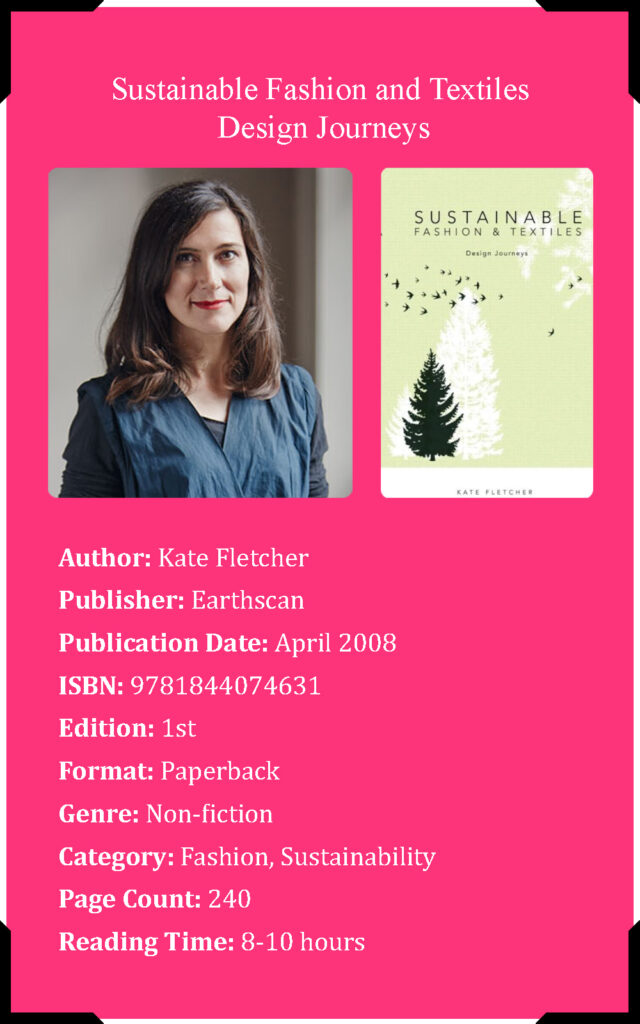
Synopsis: This foundational text delves into how sustainability can be integrated into textile and fashion design. Kate Fletcher explores eco-friendly materials, lifecycle analysis, and sustainable production methods, providing practical solutions for designers who want to create fashion with a conscience. The book is filled with case studies and discussions on the environmental and social impacts of traditional fashion production.
Reception: Regarded as one of the most important books in sustainable fashion, Sustainable Fashion and Textiles has been praised for its depth and comprehensive analysis. The Guardian calls it “a visionary look at how fashion can be reimagined to serve both beauty and the planet.”
About the Author: Kate Fletcher is a professor at the Centre for Sustainable Fashion at London College of Fashion. She is one of the pioneers in the field of sustainable fashion and has published several influential works, including Craft of Use. Fletcher is known for advocating systemic change within the fashion industry.
2. Fashionopolis: The Price of Fast Fashion and the Future of Clothes
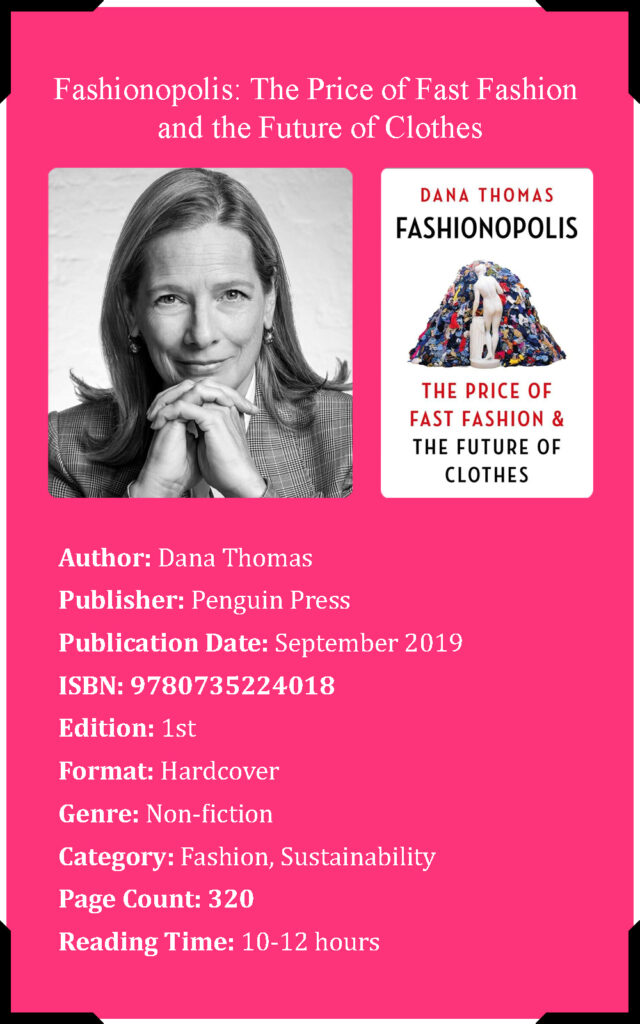
Synopsis: Dana Thomas investigates the dark side of fast fashion, revealing its toll on both people and the environment. From sweatshops to environmental degradation, Fashionopolis exposes the true cost of cheap clothing. The book also offers a glimmer of hope by highlighting innovators who are working toward more sustainable practices, from 3D printing to local production.
Reception: Thomas’s book has been lauded as an eye-opener. The New York Times calls it “a compelling and disturbing account of the global fashion industry’s practices, but also a roadmap to more ethical and sustainable futures.” The book’s balance between critique and optimism has made it a favorite among sustainability advocates.
About the Author: Dana Thomas is a journalist specializing in fashion and culture. She has written for The Washington Post, The New York Times, and The New Yorker. Thomas is also the author of Deluxe: How Luxury Lost Its Luster and continues to write about the intersection of fashion, ethics, and technology.
3. Overdressed: The Shockingly High Cost of Cheap Fashion
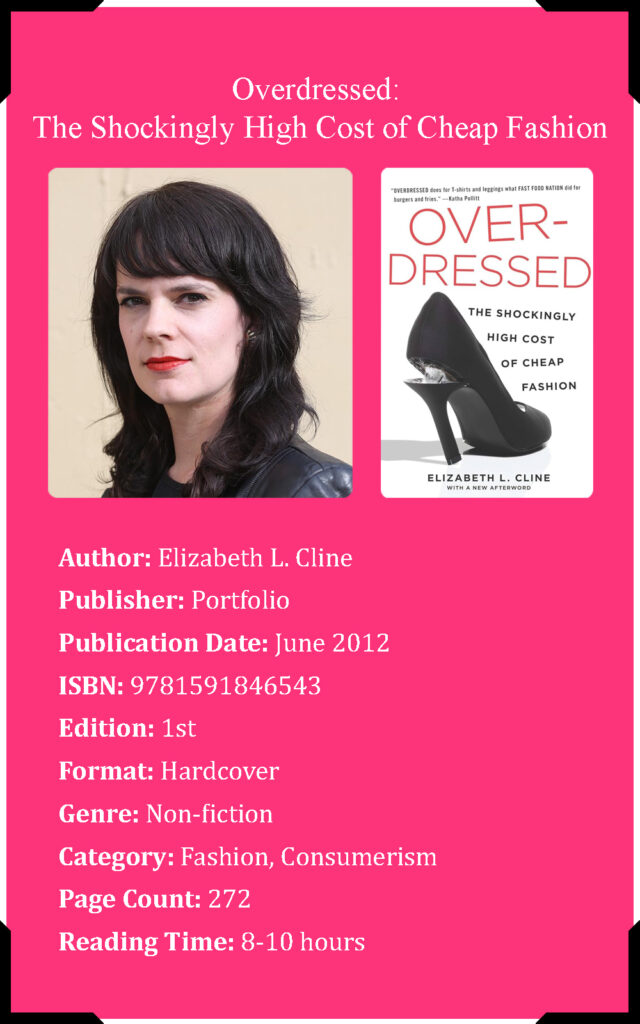
Synopsis: Elizabeth L. Cline reveals the true cost of fast fashion, from its impact on workers to the environment. She explores the rise of cheap clothing and how it has led to a disposable culture that values quantity over quality. The book advocates for a shift in consumer behavior and encourages readers to make more sustainable fashion choices.
Reception: Overdressed has been praised for its well-researched and accessible take on the fast fashion phenomenon. The Boston Globe calls it “a wake-up call for anyone who shops for clothes,” while Publishers Weekly praised Cline’s “engaging and insightful look at a complex issue.”
About the Author: Elizabeth L. Cline is a journalist and expert on fast fashion and sustainability. Her work has appeared in publications such as The Atlantic, Fast Company, and The Nation. Cline’s other book, The Conscious Closet, continues her exploration of ethical consumerism and responsible fashion practices.
4. Slow Fashion: Aesthetics Meets Ethics
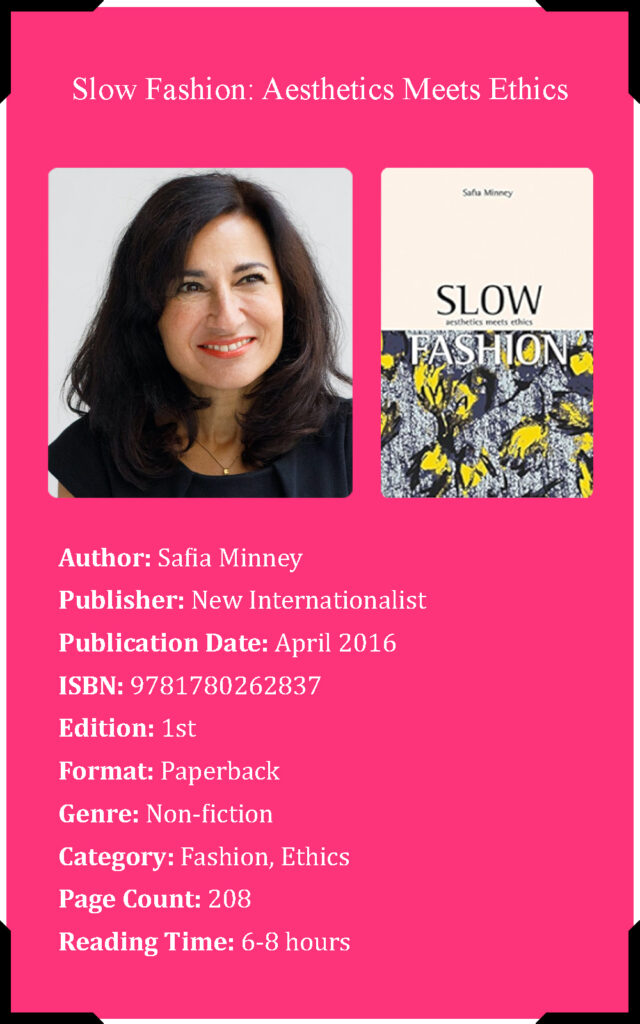
Synopsis: Slow Fashion: Aesthetics Meets Ethics brings together case studies, interviews, and visuals to showcase the slow fashion movement. Safia Minney, the founder of People Tree, demonstrates how style and sustainability can work together. The book covers the benefits of fair trade and sustainable fashion from the perspectives of designers, producers, and consumers.
Reception: Minney’s book is a celebrated resource for ethical fashion enthusiasts. Vogue wrote, “Minney’s deep knowledge and commitment to slow fashion make this a must-read for those looking to align their fashion choices with their values.” Readers have found it both inspiring and informative, particularly for its real-life examples.
About the Author: Safia Minney is a social entrepreneur and the founder of People Tree, a pioneering fair trade fashion brand. She is an advocate for ethical business practices and has received numerous awards for her work in sustainable fashion. Minney has also authored Slave to Fashion, which explores modern slavery in the garment industry.
5. The Sustainable Fashion Handbook
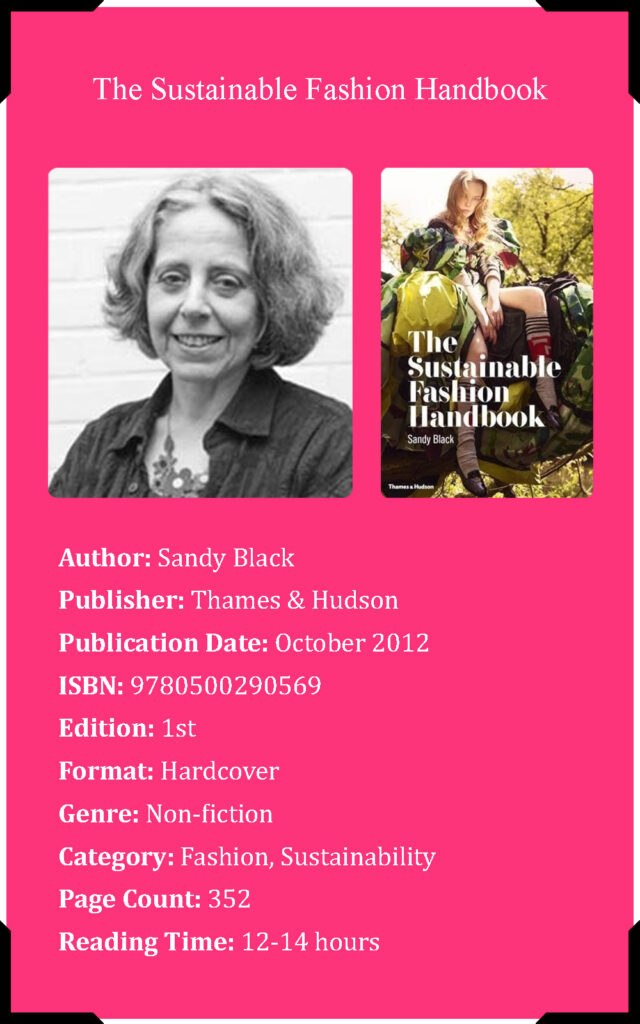
Synopsis: A comprehensive guide, The Sustainable Fashion Handbook covers everything from sustainable design and production to marketing and retail. The book features essays, case studies, and interviews with designers, manufacturers, and activists working to make fashion more sustainable. It provides a 360-degree view of the industry and is an invaluable resource for fashion professionals.
Reception: Critics have praised The Sustainable Fashion Handbook for its detailed and wide-ranging content. The Financial Times called it “an essential guide for designers and consumers alike, offering a 360-degree view of the industry.” It is highly recommended for anyone seeking a deeper understanding of fashion’s environmental and ethical challenges.
About the Author: Sandy Black is a professor of fashion and textile design and technology at the London College of Fashion. She has authored several influential books on sustainable fashion, including Eco Chic. Black’s work focuses on innovative design practices that reduce fashion’s environmental footprint.
6. Cradle to Cradle: Remaking the Way We Make Things
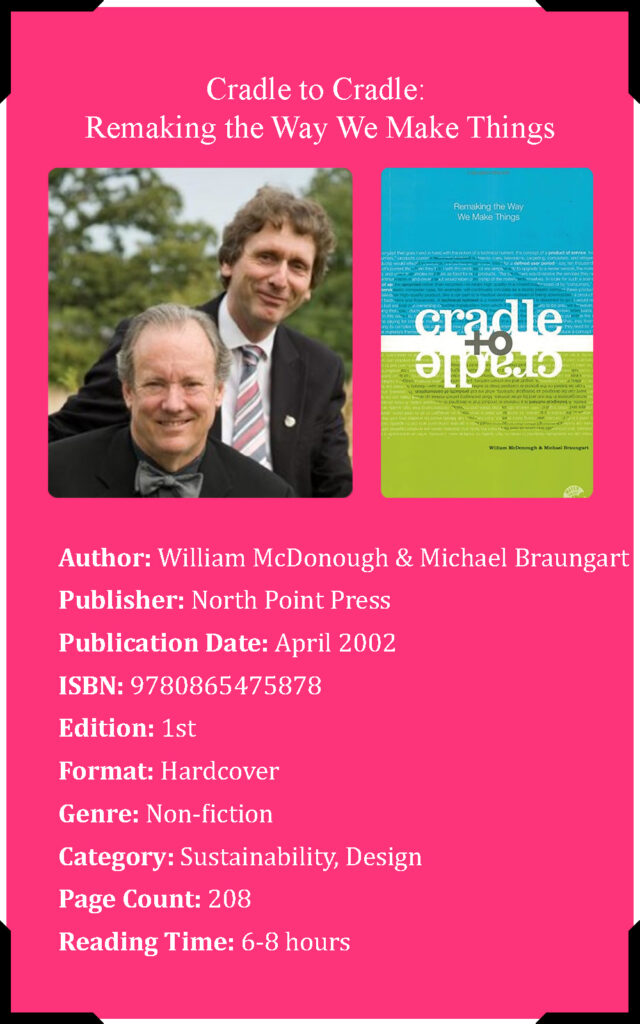
Synopsis: Cradle to Cradle challenges the traditional linear model of production and consumption, advocating instead for a circular economy where products are designed for reuse, recycling, or biodegradability. Although not solely focused on fashion, this book has been highly influential in shaping sustainable design practices across various industries, including fashion.
Reception: Cradle to Cradle has been hailed as a visionary text. The New York Review of Books noted, “McDonough and Braungart offer a bold and transformative vision of a waste-free future.” The book’s emphasis on circular design has resonated strongly with sustainability advocates in fashion.
About the Authors: William McDonough is an architect and leader in sustainable design, while Michael Braungart is a chemist and founding member of the Environmental Protection Encouragement Agency. Together, they developed the Cradle to Cradle framework, which has been applied to various industries, including textiles and fashion.
7. To Die For: Is Fashion Wearing Out the World?
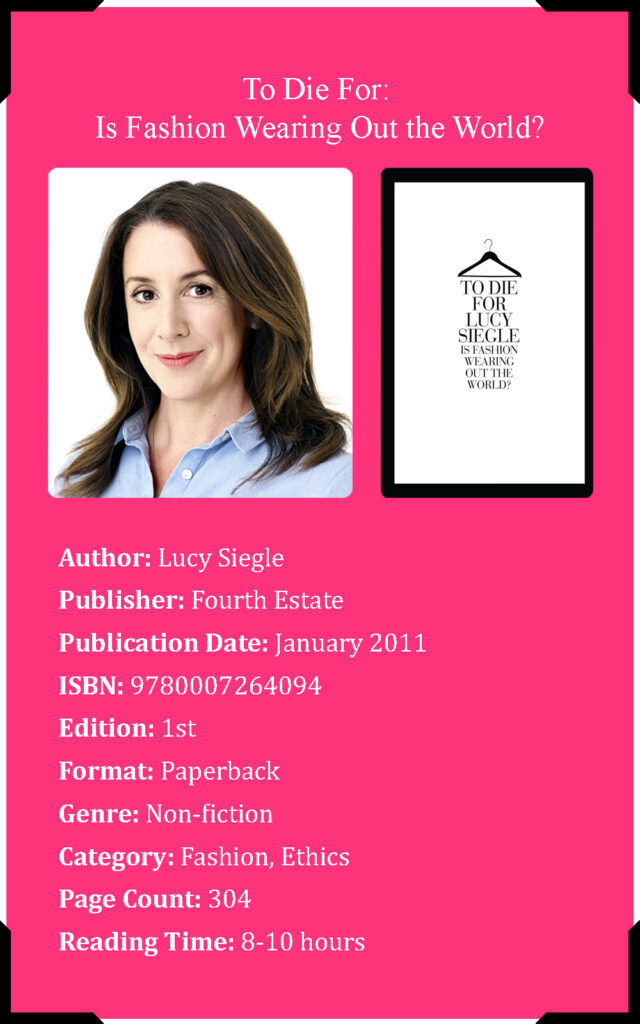
Synopsis: Lucy Siegle’s To Die For takes a critical look at the impact of the fashion industry on the environment and the workers who produce our clothes. Siegle argues for a more ethical fashion industry, offering practical solutions for how we can all play a part in transforming fashion into a force for good.
Reception: Critics have praised To Die For for its clear-eyed and passionate approach to ethical fashion. The Independent wrote, “Siegle lays bare the often-hidden costs of our clothes and offers a compelling argument for change.” The book has been particularly popular among conscious consumers.
About the Author: Lucy Siegle is a British journalist and broadcaster specializing in environmental issues. She writes a weekly column for The Observer and is a frequent contributor to television programs such as The One Show. Siegle is an outspoken advocate for ethical fashion and sustainability.
8. The Conscious Closet: The Revolutionary Guide to Looking Good While Doing Good
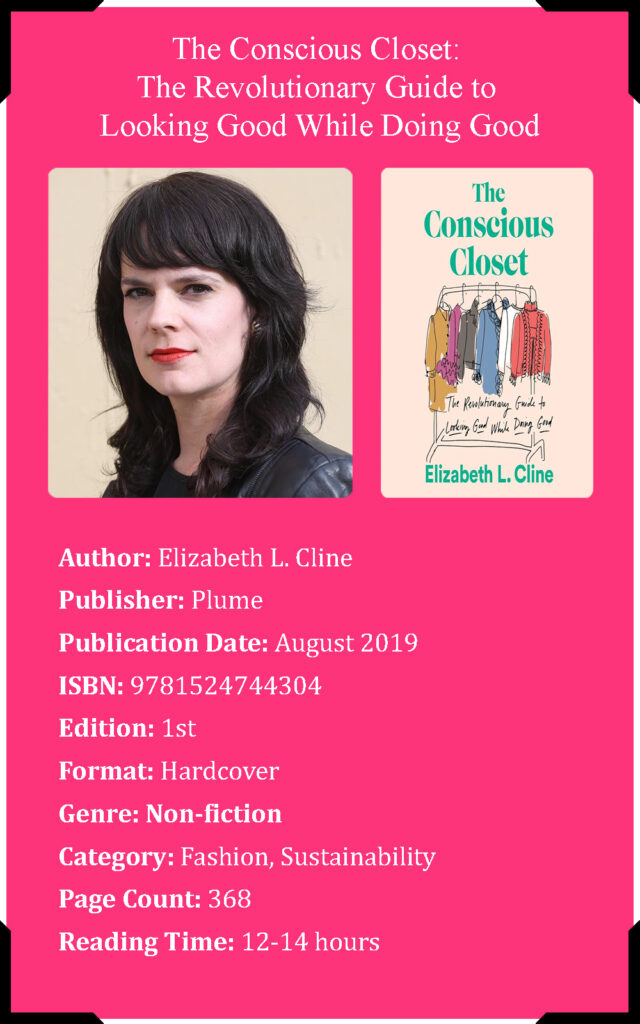
Synopsis: In The Conscious Closet, Elizabeth L. Cline offers readers a guide to building a more sustainable wardrobe. The book covers everything from decluttering to buying better-quality clothing and supporting ethical brands. Cline empowers readers to become more conscious consumers while still enjoying fashion.
Reception: The book has been highly praised for its actionable advice and optimistic tone. The Washington Post called it “an essential read for anyone looking to balance style with sustainability.” The book has resonated with those looking to make a positive change without sacrificing fashion.
About the Author: Elizabeth L. Cline is a journalist and author focusing on sustainability and fashion. She is the author of Overdressed and writes regularly for outlets such as The Atlantic and Fast Company. Cline is a leading voice in the sustainable fashion movement.
9. Fashion, Sustainability, and the Anthropocene
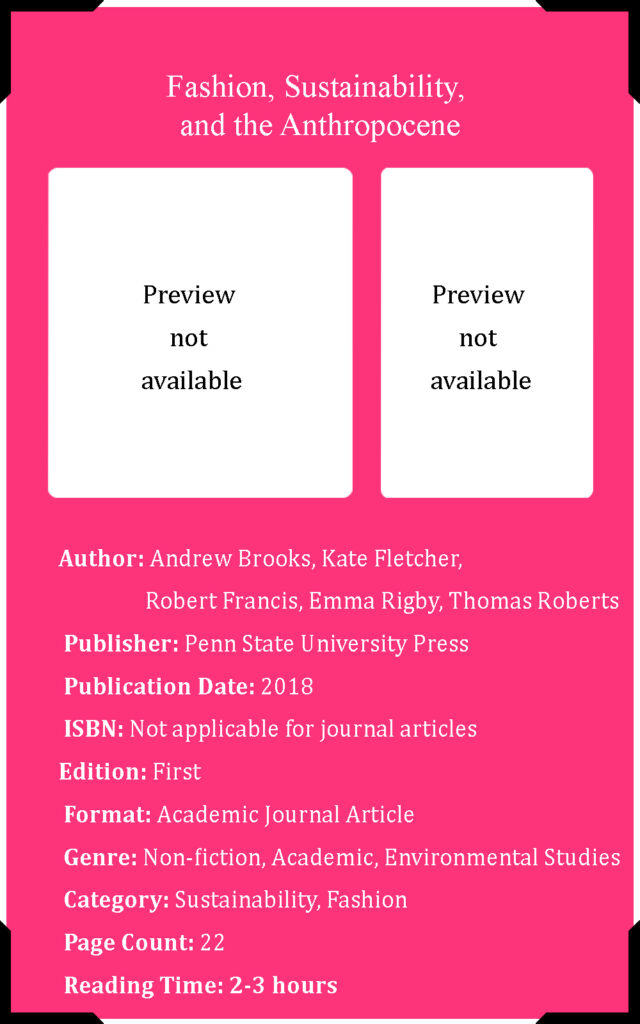
Synopsis: This academic text explores the intersections of fashion, sustainability, and the Anthropocene—the current geological age defined by human impact on the planet. The authors examine how fashion can contribute to or mitigate the effects of climate change, offering an in-depth analysis of the industry’s environmental footprint.
Reception: The book has been praised in academic circles for its critical approach to the subject. The Journal of Fashion Theory called it “a necessary text for anyone studying the future of fashion in an age of environmental crisis.” It is widely regarded as a key resource for fashion scholars.
About the Authors: The authors of Fashion, Sustainability, and the Anthropocene bring together diverse expertise from fields such as environmental science, fashion, and sustainability. Andrew Brooks is a geographer and author known for his work on global development and the environmental impacts of human consumption. Kate Fletcher is a leading figure in sustainable fashion, whose research focuses on sustainable design practices and the lifecycle of garments.
Robert A. Francis is an expert in environmental science, with a focus on the intersection of urban ecosystems and human activity. Emma Dulcie Rigby and Thomas Roberts contribute their knowledge in environmental studies and policy, particularly around resource management and sustainability. Together, these authors examine the fashion industry’s role in the Anthropocene, advocating for transformative changes to address its environmental impacts.
10. Clothing Poverty: The Hidden World of Fast Fashion and Second-Hand Clothes
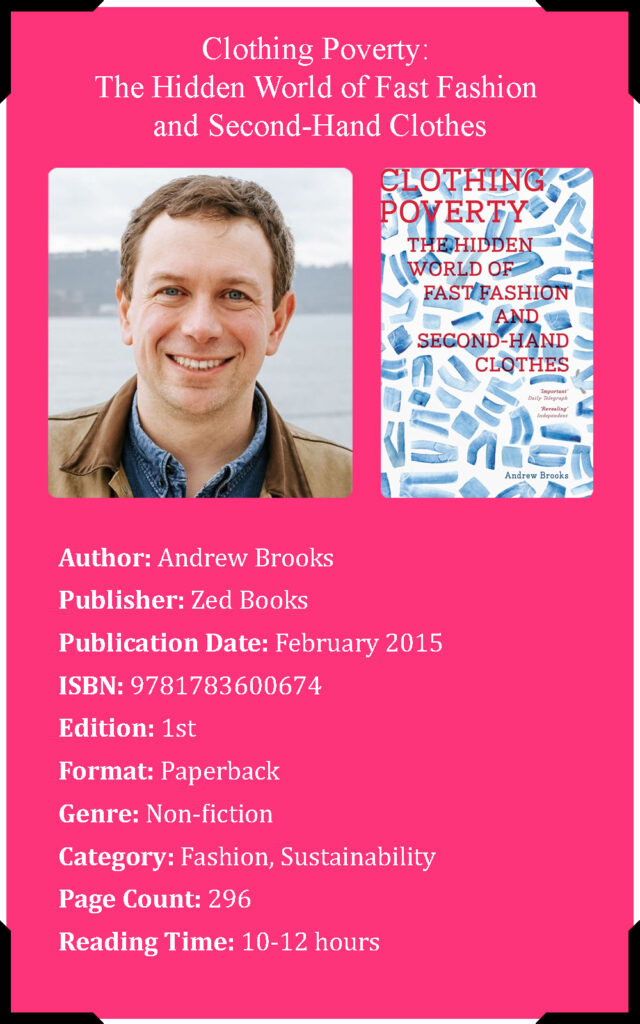
Synopsis: Clothing Poverty uncovers the hidden costs of both fast fashion and the global second-hand clothing trade. Andrew Brooks takes readers on a journey from textile factories in Asia to charity shops in the West, revealing how the modern fashion system exploits both people and resources.
Reception: Critics have praised Clothing Poverty for its hard-hitting analysis and global perspective. The Guardian noted, “Brooks shines a light on the darker side of the fashion industry, offering a sobering but necessary look at how our clothes are made.” The book is highly recommended for those interested in the ethics of fashion.
About the Author: Andrew Brooks is a senior lecturer at King’s College London, where he teaches on global development and sustainability. His research focuses on the fashion industry, globalization, and environmental issues. Clothing Poverty is his most well-known work, but he has also published numerous academic papers on sustainability.
Conclusion
These ten books are invaluable for anyone seeking to understand and engage with the sustainable fashion movement, whether you’re a professional, student, or conscious consumer. They collectively provide a comprehensive understanding of the current fashion landscape, illustrating the environmental, social, and economic impacts of traditional fashion systems. From exposing the dark realities of fast fashion to showcasing inspiring examples of innovation and ethical practices, these works offer both critique and hope for a more sustainable future.
The books delve into the core issues at the heart of fashion today—overconsumption, labor exploitation, waste, and pollution—while offering practical alternatives that prioritize the well-being of the planet, and the people involved in garment production. They do more than highlight the problems; they empower readers with knowledge on how to be part of the solution, whether through better consumer choices, more ethical design practices, or advocating for systemic industry changes.
Sustainable fashion is no longer just a trend but a necessary shift toward a more responsible future. These books help illuminate the path forward, providing both inspiration and guidance. By reading and engaging with these texts, we not only become more informed about the impact of our fashion choices but are also motivated to support, design, and advocate for a more ethical, sustainable fashion industry. The transformation of fashion begins with awareness, and these books serve as the perfect starting point for that journey.


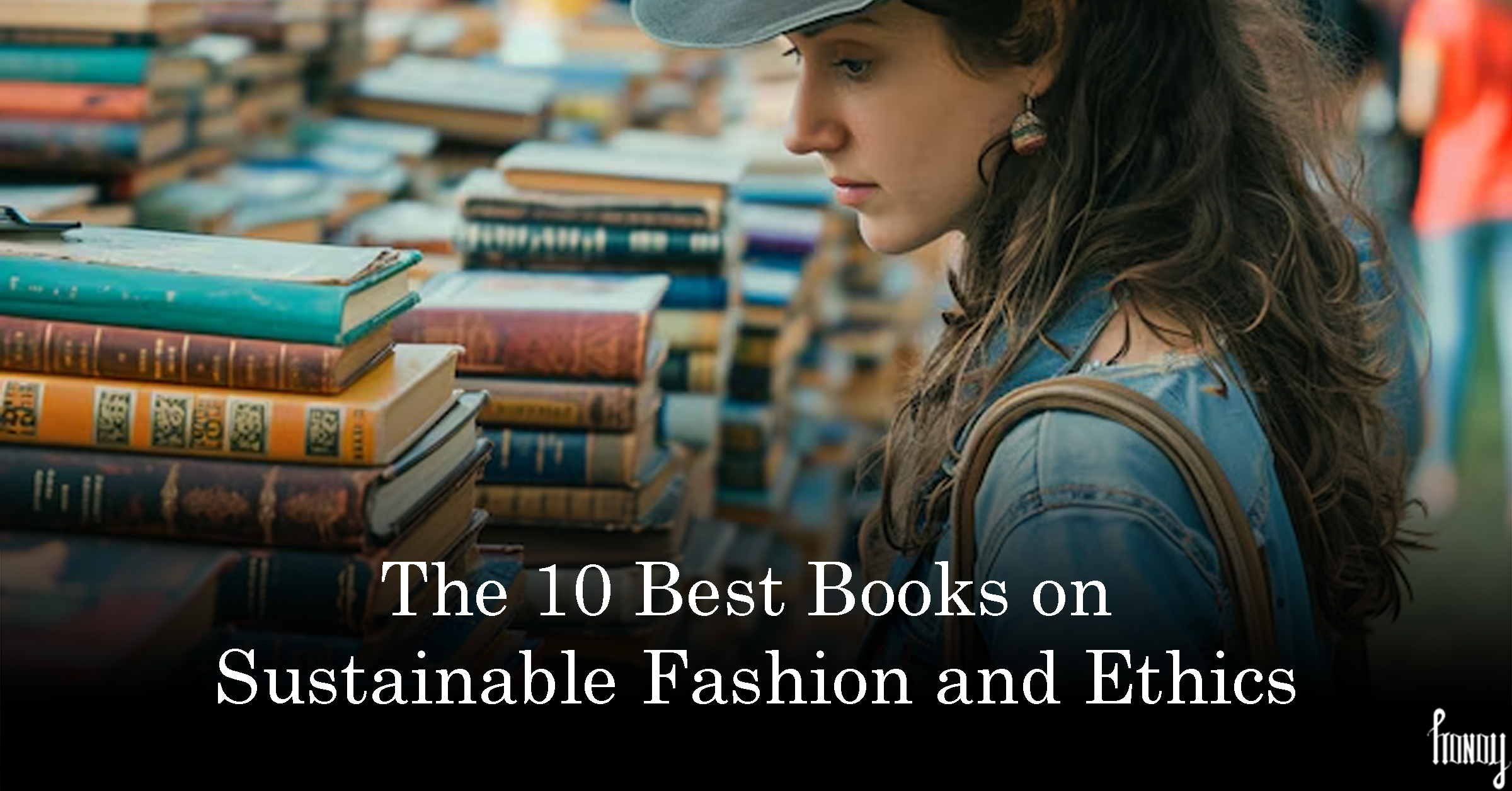


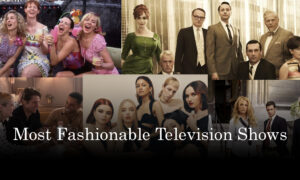

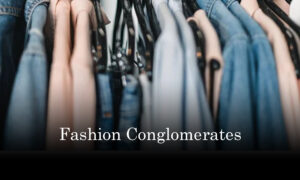

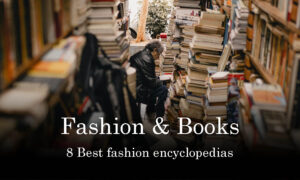

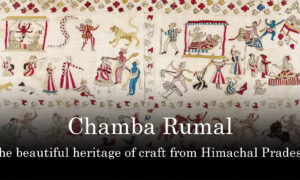



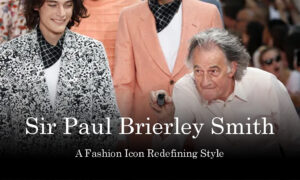



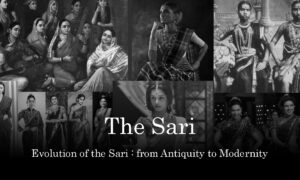









Scarlett1092
April 26, 2025 at 4:26 am
Awesome
Alexia3508
April 26, 2025 at 5:32 am
Awesome
Hanna381
April 28, 2025 at 12:47 pm
Very good
Lauren554
April 28, 2025 at 11:13 pm
Good
Erika1037
April 28, 2025 at 11:34 pm
Awesome
Felicity1170
April 29, 2025 at 1:33 am
Good
Zoe2266
April 29, 2025 at 3:10 pm
Good
Brielle1101
April 30, 2025 at 3:21 pm
Awesome
Darby2324
April 30, 2025 at 7:19 pm
Good